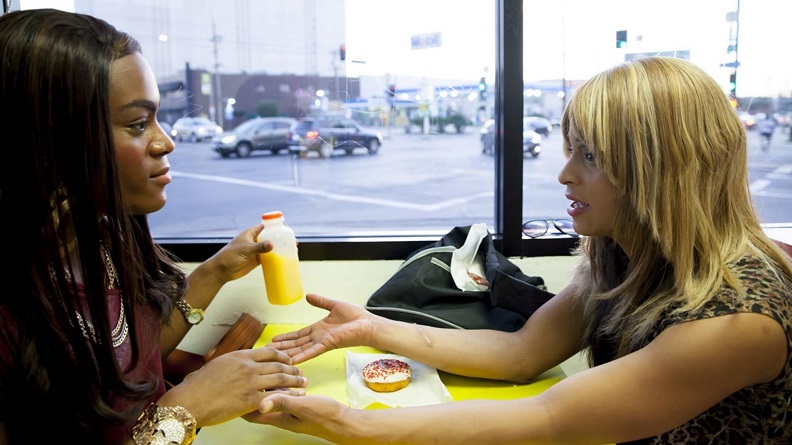Tangerine
Director: Sean Baker
8 p.m. Friday, 8 p.m. Saturday
Oklahoma City Museum of Art
B
It’s always peculiar when a film shot with modified iPhones so truly echoes the sound of classic cinema. More peculiar still is when the same film centers on the trials of trans sex workers living in Los Angeles. Sean Baker’s Tangerine, though not an utter stylistic homage, strums so many thematic chords that it’s difficult to find comfort in a subject matter surely unfamiliar to most. Enlisting the aid of two transgender actresses, Tangerine has a certain authenticity not found in many other films.
Recently released from prison, Sin-Dee (Kitana Kiki Rodriguez) meets with her best friend and fellow prostitute Alexandra (Mya Taylor) to celebrate both her release and Christmas. After learning of her boyfriend Chester’s (James Ransone) adulterous behavior since her incarceration, Sin-Dee searches recklessly through the L.A. underground for her shady lover and the cisgender woman he’s been sleeping with. At the same time, Razmik (Karren Karagulian), an Armenian cab driver, desperately attempts to hide his affinity for trans women from his family, but the investigations of his overly critical mother-in-law makes his secret far more difficult to veil.
With its guerrilla filmmaking, implemented by Baker and co-writer Chris Bergoch, Tangerine presents a narrative power that is both visceral and strikingly intimate. In one instance, Sin-Dee storms into a makeshift brothel, complete with bumbling (and nude) patrons as well as several indicators of indiscriminate drug use. This environment is framed in a way that doesn’t elicit disgust as much as intrigue and laughter. Early scenes in Razmik’s taxi showcase the variety of customers he serves, most of whom are any combination of incoherent or utterly detached in some half-fictionalized variant of Taxicab Confessions. This crawl through Tinseltown is a jarring concoction that manages to be ballsy, comical, and pressingly bold.
Tangerine’s soundtrack is an equally schizophrenic tandem, pairing modern EDM with antiquated tunes that channel Charlie Chaplin films. Baker traces a genetic trail from his work to the monuments of Golden Age cinema, doing so without any signs of irreverence. One moment finds Sin-Dee smoking a cigarette, impatiently waiting for her bout of frustration to pass over. Shot from behind her head, in an instance loosely reminiscent of City Lights, a bus slowly crawls in front of her as the normalized masses slowly pour out. Sin-Dee’s musings, illustrated with a soft melody, gradually give way to her more aggressive yet honest self as the heavy-hitting electronic beat resumes.
Denial and failed attempts at charity follow the journey of Tangerine. “Since it’s Christmas” often prefaces the film’s numerous sexual transactions, but these advances typically end in violence or, at the very least, arguments. Likewise, Razmik’s fear of his own sexuality is heavily contrasted by his relationship with a slew individuals who, despite living in relative poverty, have at least come to terms with that aspect of their life. Flawed in other respects, the subtle boons of these individuals are illuminated just enough to cherish. It’s definitely not the most uplifting tale, but there’s a shred of optimism uncovered in the plight of each character.
Above all else, Tangerine is relentlessly entertaining and thought-provoking. Where Charles Burnett’s Killer of Sheep may have ostracized some, Baker manages to provide another sincere look at the underside of Los Angeles without compromising its authenticity. So much so, in fact, that “underside” should be disqualified in reference to this way of life.





